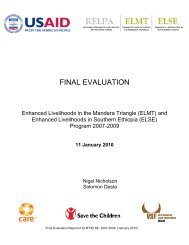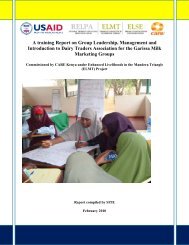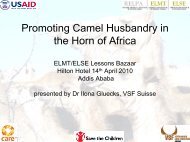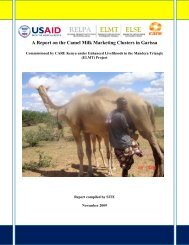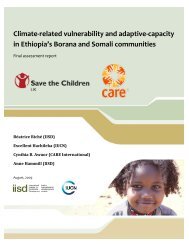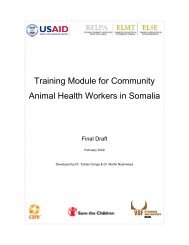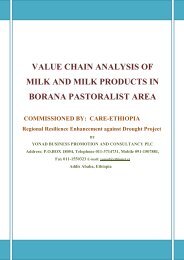care international in ethiopia – pastoral drop out study - ELMT Home
care international in ethiopia – pastoral drop out study - ELMT Home
care international in ethiopia – pastoral drop out study - ELMT Home
You also want an ePaper? Increase the reach of your titles
YUMPU automatically turns print PDFs into web optimized ePapers that Google loves.
system, the FGD members asserted that there is no one process as such to be followed. The<br />
action to be taken depends on several <strong>in</strong>dividual situations.<br />
Under normal drought situation when pasture and water become a problem, people consult<br />
each other to decide where, when and how to move to save human and livestock. In such<br />
cases they often move their livestock and return back to their homestead when situation<br />
improves. This is part of their traditional herd management system and the consultation<br />
between members dur<strong>in</strong>g such a situation is so <strong>in</strong>tensive and structured that consensus<br />
should be built on who should move with which type and age groups of animals and where<br />
to move.<br />
If however, war breaks <strong>out</strong> and people lost their livestock there is no serious consultation to<br />
be made; <strong>in</strong>dividuals make their own decisions where and when and how to rescue their lives<br />
based on their own circumstances. People can escape to places where they can be accepted<br />
and get support. Even under sever drought situation, once an <strong>in</strong>dividual lost his herd, the<br />
level of consultations made by members is very limited. Under such a situation the decisions<br />
to move or to use other strategies to save lives are made <strong>in</strong>dividually. In general, when it<br />
comes to mov<strong>in</strong>g <strong>out</strong> of the <strong>pastoral</strong> system <strong>in</strong> search of other livelihood strategies decisions<br />
are made <strong>in</strong>dividually. Factors such as availability of relatives <strong>in</strong> places where one wants to<br />
move, pre-exist<strong>in</strong>g social relationships with communities to move, availability of government<br />
and NGO support, proximity to centers where food aid distribution is a permanent feature<br />
and skill such as carpentry, masonry are important <strong>in</strong> guid<strong>in</strong>g what directions to take when<br />
decid<strong>in</strong>g to move <strong>out</strong>.<br />
It is not always true to say that one leaves the system and become a <strong>drop</strong><strong>out</strong> when he<br />
becomes a qolle because of drought or war. In some cases such people look for friends who<br />
could come <strong>in</strong> and support them to re-establish and stay with<strong>in</strong> the system. If the victim has<br />
been a generous person before he becomes qolle he can seek for community support and he<br />
can even collect more animals than what he had before. If he were a mean person, no body<br />
will come to help him <strong>out</strong> and could rema<strong>in</strong> qolle forever and <strong>drop</strong><strong>out</strong> of the system. If a<br />
wealth herd owner hit by drought and lost all or most of his livestock, the first th<strong>in</strong>g he does<br />
is to collect back the debares he has given <strong>out</strong> before and re-establish himself. Those who<br />
30




